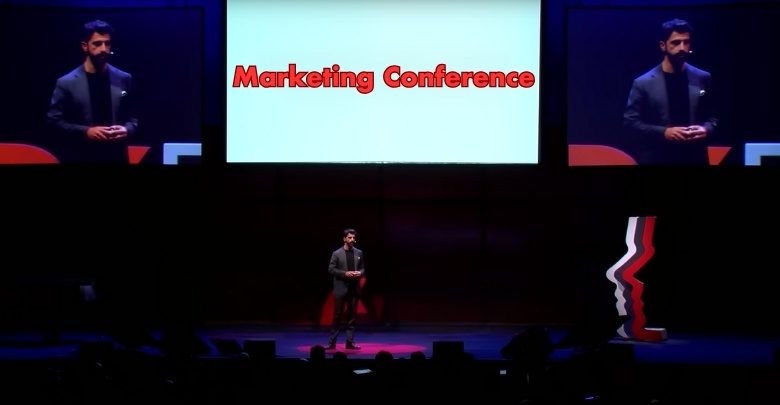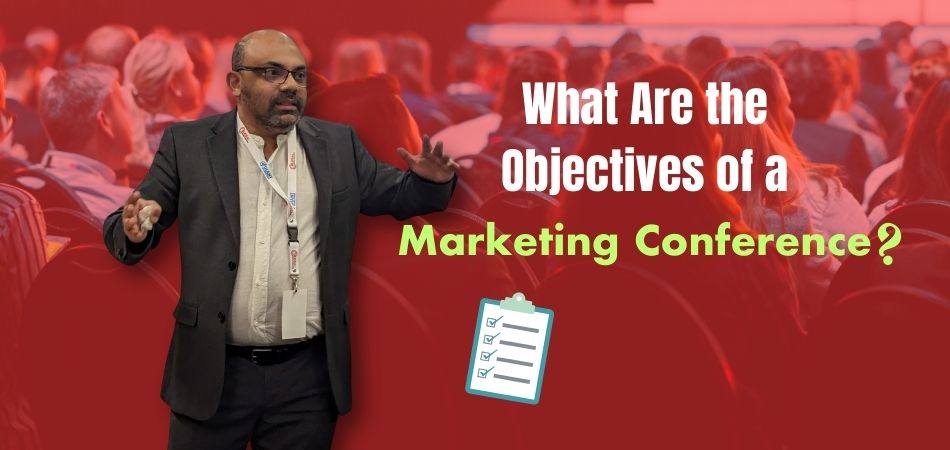In the current highly competitive business environment, marketing conferences have emerged as crucial events across industries. These conferences are central stages for sharing innovative tools and discussing growing trends. If you’re wondering: what are the objectives of a marketing conference? You’re in the right place.
Networking among peers, learning new tactics, and sharing insights are the main goals of marketing conferences. These events provide a platform for professionals to gain knowledge about market dynamics, improve branding skills, and access exclusive tools necessary for advancing their marketing strategies.
Are you curious about the detailed benefits and objectives of attending a marketing conference? Continue reading this article to find all the necessary information that can help guide your decision to participate in these enriching events.
How Marketing Conferences Impact a Business?
Marketing conferences contribute to a business’s growth by providing opportunities for networking, learning, and innovation. Attending such events allows businesses to connect with industry experts, potential clients, and collaborators, building relationships that can lead to new ventures and partnerships.

These conferences serve as hubs for gaining insights into the latest trends, tools, and strategies in the ever-evolving marketing environment. Businesses can learn from real-world success stories, participate in workshops, and explore case studies to improve their marketing efforts and achieve better results.
In particular, international marketing conferences expand these benefits to a global scale. They expose businesses to diverse markets, cultural insights, and innovative strategies from across the world. This global perspective equips companies to refine their marketing strategies, ensuring they stay competitive and resonate with audiences on international markets.
What Are the Objectives of a Marketing Conference?
A marketing conference is a key event for professionals to exchange insights, learn new strategies, and network. It provides an opportunity to stay updated on trends and build connections for business growth. Here are the main objectives of such conferences:
Improve Industry Knowledge
Marketing conferences bring experienced speakers who share trends, data, and tools to grow attendees’ industry expertise. Professionals learn practical strategies, explore fresh methods, and understand market dynamics better. Sessions offer targeted education for those seeking new paths to stand out in competitive markets.
Building Meaningful Networks
These events create excellent opportunities for professionals to connect with peers and experts. Engaging in networking sessions lets attendees exchange innovative ideas and form strong business relationships. Connecting with diverse individuals often leads to partnerships and long-term success.
Strengthening Branding Skills
Participants learn ways to build impactful brand identities that resonate with target audiences. It is common for presentations to focus on ways to improve messaging, visuals, and emotional branding. Hands-on workshops help refine approaches and sharpen strategic skills for real-world applications.
Encourage Creative Thinking
Interactive sessions inspire creativity by presenting amazing ways to solve everyday marketing problems. Keynote speeches often highlight case studies or campaigns that show the value of thinking differently. These events encourage professionals to explore untried approaches to achieve remarkable outcomes.
Accessing Exclusive Tools
During marketing conferences, attendees get first access to the latest tools, platforms, and technologies. Exhibitors frequently showcase advanced software or applications designed to simplify tasks or improve campaigns. This exposure equips participants with resources to optimize performance and efficiency.
Promoting Team Collaboration
Workshops at these conferences encourage teams to collaborate and align on common goals. Activities provide chances for professionals to brainstorm new projects or refine strategies together. This shared experience often leads to better internal communication and project management improvements.
Improving Leadership Abilities
Marketing professionals develop stronger leadership qualities by learning decision-making frameworks and communication strategies. Discussions often revolve around best practices for leading teams, managing change, and staying adaptable. These lessons empower leaders to build cohesive and successful marketing departments.
Boosting Confidence
Engaging with thought leaders helps participants feel confident about their skills and knowledge. Interactive exercises, case study reviews, and personalized guidance offer assurance in handling tough situations. Returning to work energized builds momentum, leading to greater achievements.
Exploring New Opportunities
Conferences introduce attendees to potential clients, partners, or business growth avenues. Vendors present innovative solutions designed for specific industries, while sessions discuss global opportunities. These events often act as launching points for attendees to expand their professional horizons.
Marketing conferences give professionals knowledge, skills, and tools for success in a dynamic industry. Networking, education, and opportunities combine to create events that leave attendees inspired and equipped.
What to Consider Before Attending a Marketing Conference?
Taking part in marketing conferences offers the chance to broaden your network, increase your level of expertise, and gain exciting insights. Choosing the right event can amplify your career path. This guide highlights additional key factors you must know before registering for a conference.
Plan Your Budget Thoughtfully
Allocating funds for conferences is crucial. Ensure your budget covers registration fees, travel costs, and accommodations, ensuring no last-minute surprises. Account for extras like meals or materials. Consider early-bird discounts, which often provide significant savings. Research financial support or employer sponsorships, if applicable. A detailed budget helps avoid overspending while ensuring a smooth experience.
Investigate Networking Opportunities
Conferences are excellent for meeting professionals, but analyzing networking formats is critical. Some events offer structured sessions, while others encourage informal interactions. Look for chances to engage in roundtables, workshops, or after-hours meetups. Strong networking components improve your ability to build meaningful connections. Choose events with planned activities where participants collaborate directly with peers and leaders.
Check for Hands-On Learning
Interactive sessions, such as workshops or case studies, offer practical learning experiences. Events helping active participation opportunities you better understand concepts and solutions. Explore conferences with skill-building exercises and personalized feedback to improve your techniques. Emphasis on applicable knowledge ensures value. Practical activities also make long-term implementation easier.
Know the Registration Process
Early registration guarantees your place and might result in savings. Some events cap attendance, so delay could cost your participation. Carefully review the registration steps to ensure hassle-free processing. Suppose, you’re planning to attend a Canadian marketing conference. Before you register for a marketing conference in Canada, you have to make sure to review the agenda.
Pay Attention to Schedule Compatibility
Your attendance may be affected by time limitations. Verify that the conference schedule aligns well with your calendar and other commitments. Overloaded agendas can cause stress, while a sparse schedule may waste resources. Look for concise yet impactful sessions. Flexible timing allows for personal planning without compromising content intake or engagement opportunities.
A marketing conference should improve your skills, broaden your horizons, and energize your ambitions. Research thoroughly and make well-informed decisions to maximize its impact on your trip. Always prioritize relevance, efficiency, and value for a worthwhile investment in yourself.
How to Find the Right Marketing Conference?
Choosing the right marketing conference can boost your knowledge and network. It can help you discover new trends, connect with industry leaders, and gain fresh perspectives. However, finding the right fit requires some thought. A well-chosen conference can improve your career and business growth in valuable ways. Below are the tips to find the right marketing conference:
Step 1. Define Your Goals
Start by clearly defining what you want to achieve from attending a conference. Knowing your goals will help you identify events that align with your needs. Suppose you’re planning to attend a Canadian conference. Check if the topics at marketing conferences in Canada align with your focus area. It can help you focus on relevant trends and opportunities. Focusing on conferences that provide value in these areas will ensure a worthwhile experience.
Step 2. Consider the Audience
Knowing the type of people who attend the conference is crucial. Look for events where the audience matches your professional level and interests. Whether you want to meet potential clients, partners, or experts, knowing the crowd will help you make meaningful connections. Choose conferences that attract attendees who can contribute to your goals.
Step 3. Check the Speakers and Content
Review the list of speakers and the topics they will cover. A strong lineup of experienced professionals can ensure you receive quality insights. You should also look into the content and ensure it addresses the latest trends in marketing. If the subjects match your interests, the event will likely be worth attending.
Step 4. Analyze the Format and Location
Consider the format of the conference, whether it’s in-person or virtual. While in-person conferences offer opportunities for networking in person, virtual events offer flexibility. Location also matters if you prefer traveling or want to attend events in specific cities. Make sure the format and location work well with your schedule and preferences.
Step 5. Read Reviews and Testimonials
Before making your final decision, check reviews and testimonials from past attendees. Learning about others’ experiences can give you valuable insights into the conference’s effectiveness. Positive feedback can indicate a well-organized event, while negative reviews may reveal potential issues. This step will help ensure you select a quality conference that meets your expectations.
Remember, the right conference will depend on your individual goals, interests, and professional needs. Take time to research and select the one that offers the most value for your growth and networking opportunities.
Tips to Make the Most of Your Next Marketing Conference
Participating in a marketing conference is an excellent opportunity for professional development, growth, and exposure. The key to success is being well-prepared and adaptable. Here are some tips to maximize your experience and seize every opportunity.
- Prepare Key Discussion Points: Bring prepared discussion topics that align with event sessions or speakers. This helps you manage conversations with direction and make them meaningful.
- Be Present and Engaged: Stay focused by putting away distractions like phones or emails. Fully engaging during presentations or conversations shows respect and leads to more rewarding interactions.
- Use Social Media Wisely: Share your conference experience online and follow relevant hashtags. This helps extend your networking reach, even beyond the attendees present at the event.
- Set Post-Conference Follow-Ups: After the conference, set aside time to follow up with newly made contacts. Following up soon after the event helps maintain the momentum of growing those relationships.
- Take Detailed Notes: Write down actionable notes rather than only listening. These records help you recall vital strategies and ideas to implement once the conference ends.
- Attend Informal Events: Conferences often host evening gatherings or coffee breaks. Attending these less formal parts of the event lets you interact with other attendees on a personal level.
- Stay Open to Spontaneous Opportunities: Flexibility during conferences often leads to unexpected but beneficial interactions. Being open to impromptu opportunities allows you to make connections that may otherwise be missed.
- Split Your Team Across Sessions: If attending with a team, divide sessions to cover more ground. Each team member can take notes, maximizing collective learning from different tracks or discussions.
- Ask Engaging Questions: When attending sessions, prepare thoughtful questions. Engaging directly with speakers makes the learning experience interactive and helps you stand out in their minds.
- Take Breaks When Needed: Burnout should be avoided at all costs. Scheduling short breaks keeps your energy level up and ensures you remain mentally present for the entire event.
Making the most of a marketing conference involves planning, active participation, and strategic follow-ups. Make new connections, engage meaningfully, and absorb the lessons learned to drive your career growth forward. Each tip strengthens your experience, making the trip truly rewarding.
FAQs About What Are the Objectives of a Marketing Conference?
Going to marketing conferences is crucial for professionals who want to succeed in the dynamic business world. Below are frequently asked questions about their objectives, designed to address unique aspects not previously discussed and provide you with additional valuable insights.
How Do Marketing Conferences Promote Professional Growth?
Through a variety of sessions and professional insights, marketing conferences proved a learning environment. Attendees gain an introduction to fresh perspectives, allowing them to grow their skill sets and confidence. These experiences often inspire participants to tackle challenges with innovative solutions and improve their long-term career development.
Can Marketing Conferences Help Identify Market Trends?
Yes, marketing conferences are ideal for identifying current and emerging trends. They often feature sessions dedicated to analyzing market shifts, consumer behavior, and innovative practices. These insights help professionals stay competitive by adapting their strategies to align with the latest trends in the marketing landscape.
How Do Marketing Conferences Impact Small Businesses?
Small businesses benefit greatly from marketing conferences by gaining access to expert advice, affordable tools, and effective strategies. They provide resources suited to limited budgets, helping small businesses refine their marketing efforts. Networking opportunities also help connect small business owners with potential collaborators or mentors.
Are Marketing Conferences Useful for Team Building?
Absolutely, attending a marketing conference as a team encourages collaboration and shared learning. Group activities, workshops, and brainstorming sessions during the conference strengthen communication and align team goals. This unified experience often translates into improved teamwork and strategic clarity back at the workplace.
How Do Marketing Conferences Support Innovation in Campaigns?
Marketing conferences provide a platform to explore creative solutions for campaign challenges. Case studies and interactive sessions demonstrate innovative approaches that have proven successful. These insights help marketers reimagine their campaigns, ensuring innovation remains at the forefront of their strategies while driving better outcomes.
Endnotes
For professionals looking to stay ahead in a constantly changing industry, marketing conferences are incredibly valuable. These events provide rich opportunities for learning, networking, and gaining new insights that can drive success in marketing strategies and business growth.
So, what are the objectives of a marketing conference? Simply put, they aim to improve industry knowledge, promote valuable connections, and introduce attendees to the latest tools and strategies. By attending, professionals gain insights that improve their marketing techniques and help them stay competitive in the market.
As you prepare for your next marketing conference, remember to stay engaged, plan ahead, and focus on networking. Take advantage of every opportunity to learn and connect. Best of luck on your trip, and may you find success in all your marketing projects!







